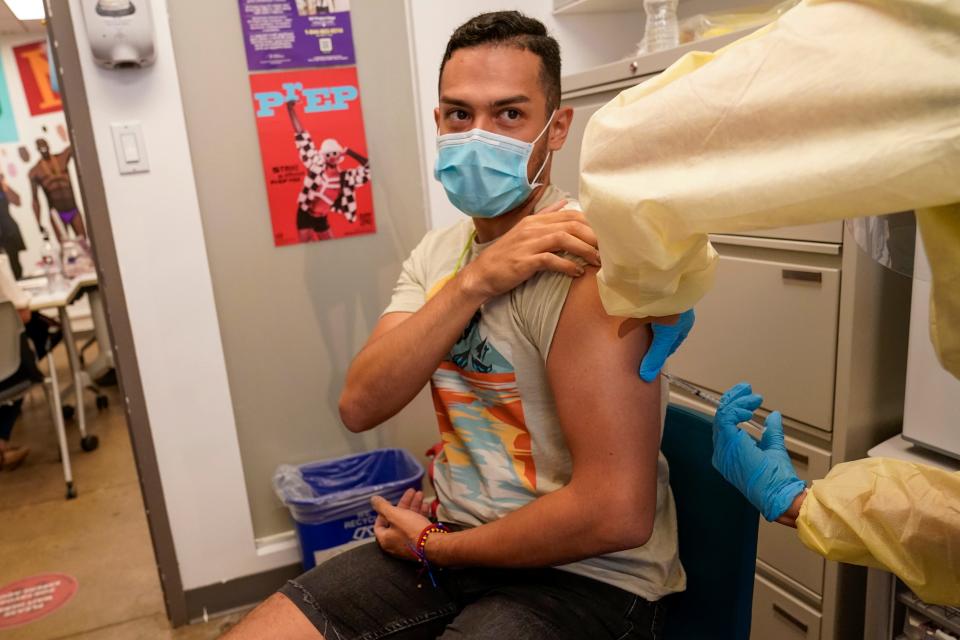As CDC reckons with flawed COVID-19 response, approach to monkeypox is finally improving
Changes are finally underway with our national approach to monkeypox, hopefully with more to come. Testing, vaccination and treatment efforts have been seriously delayed, reminiscent of public health shortcomings in response to the COVID-19 pandemic.
When it comes to the Centers for Disease Control and Prevention, some have argued that disorganization, excess caution and vetting are an essential part of CDC culture, so when CDC Director Rochelle Walensky announced last week that there would be a redirection toward real-time information and clearer public education, few believed her.
But when it comes to monkeypox, positive changes are already taking place.
For public health, real-time information is crucial
For one, the CDC shared results from an online survey released this week (before any peer review) revealing:
►48% of men who have sex with men have reduced their number of sex partners because of the monkeypox outbreak.
►50% have reduced one-time sexual encounters.
►49% have cut back on sex with partners met on dating apps or at sex venues.
Since this monkeypox outbreak has spread predominantly through sexual contact among men, this real-time information is crucial to determine that public health messaging is working.
WHO and world leaders: How we're building better, more equitable vaccine systems
The CDC is now more carefully tracking monkeypox testing. As of Wednesday, more than 74,000 tests had been conducted, with a cumulative positivity rate of over 32%. Perhaps more important, the rate has been falling since testing started in May. For a test to be used effectively, you need to see far more negatives than positives, meaning that you are testing a large enough population – and we are finally starting to get there with monkeypox.
The CDC is also doing a better job of tracking confirmed monkeypox cases in the United States (16,603 as of Wednesday), providing a breakdown by race, age and gender (almost entirely male), as well as reporting which states are most heavily hit (California, New York, Florida, Texas, Georgia and Illinois).
What does monkeypox mean for back to school? It's time for you to talk about monkeypox

Studying and ordering more monkeypox treatment
They are also accumulating data on the use of TPOXX. As of last Thursday, the CDC had processed and reported data on 288 people treated with TPOXX relying on an expanded access investigational protocol for new drugs. This number might seem small, until you consider that the goal is to provide enough human data for the Food and Drug Administration to issue an emergency use authorization for TPOXX to treat monkeypox.
Monkeypox: It's not a matter of whether it will spread widely. We need to focus on when.
I think we are almost there, though the FDA is unfortunately still requesting clinical trials for safety and efficacy first. The emergency use authorization will be a humane and important move because TPOXX can reduce the painful symptoms of the rash and hasten healing.
Opinion alerts: Get columns from your favorite columnists + expert analysis on top issues, delivered straight to your device through the USA TODAY app. Don't have the app? Download it for free from your app store.
The larger issue is still the paucity of the JYNNEOS vaccine for monkeypox, but the Administration for Strategic Preparedness and Response (ASPR) is in charge of the national stockpile.
The agency's decision last week to use one vial of JYNNEOS to protect five people is a step in the right direction, but what we really need is millions more vaccines. The Department of Health and Human Services has ordered 5.5 million more doses from Bavarian Nordic with 2.5 million of these to be filled and finished by a U.S. manufacturer, but the delay will still be months.
Student loan forgiveness is a good start: But it falls short for borrowers like me
What CDC can do, and is now doing, is to provide a road map for who gets the highest priority for the monkeypox vaccine and in which states. Clearly, the primary focus needs to be on the states most heavily hit.

Rapid response to an outbreak like monkeypox represents a paradigm shift that certainly won’t be accomplished overnight. But the CDC director committing her agency to this essential change is at least a step in the right direction. Now we need the rest of Health and Human Services, from the FDA to ASPR, to follow suit.
The time for politicking is over. We have lost too many lives to posturing and pronouncements.
As Walensky herself said to me last week, “It’s frustrating when people are making health decisions through a political lens.”
More from Dr. Marc Siegel:
Treating HIV taught us about inclusive care. Now monkeypox is testing what we learned.
How to break cycle of fear driven by COVID and war. And protect your kids' mental health.
Ukraine war revives my nuclear nightmares. But Zelensky's courage gives me hope.
Dr. Marc Siegel, a member of USA TODAY's Board of Contributors and a Fox News medical correspondent, is a professor of medicine and medical director of Doctor Radio at NYU Langone Health. His latest book is "COVID: the Politics of Fear and the Power of Science." Follow him on Twitter: @DrMarcSiegel
You can read diverse opinions from our Board of Contributors and other writers on the Opinion front page, on Twitter @usatodayopinion and in our daily Opinion newsletter. To respond to a column, submit a comment to letters@usatoday.com.
This article originally appeared on USA TODAY: US monkeypox response improves as CDC learns from COVID mistakes


